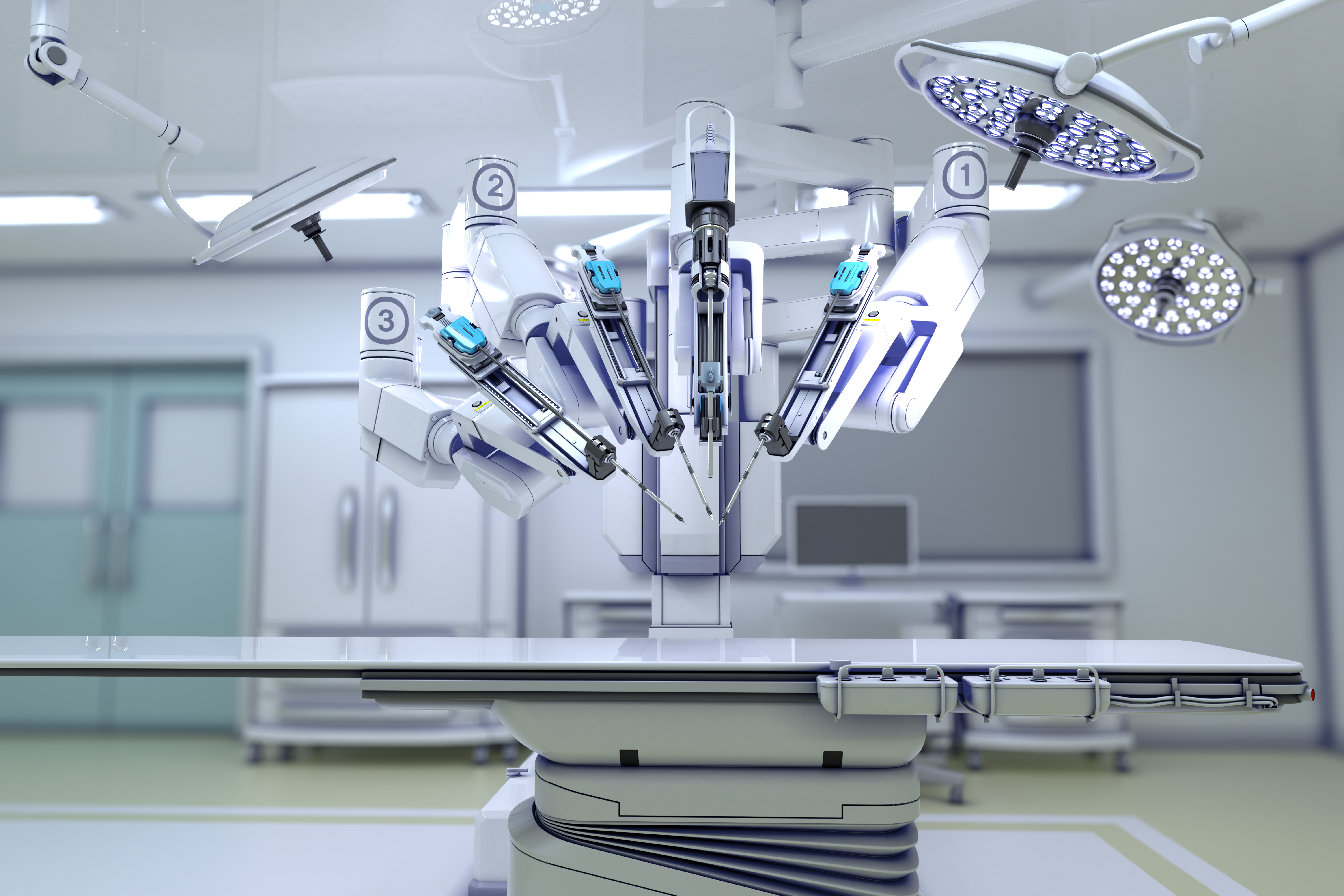The Future of Women's Healthcare: Understanding Robotic Gynecologic Surgery
Have you ever wondered what it would be like if your surgeon had the precision of a robot combined with years of medical expertise? Well, that future is already here! Robotic surgery has revolutionized many medical specialties, and gynecology is no exception.
If you're facing a gynecologic procedure, you might be asking yourself: "What exactly is robotic surgery?" or "Could this be right for me?" This advanced surgical approach is transforming how we treat various women's health conditions, offering new possibilities for precision, recovery, and patient outcomes. Let's dive in and explore what robotic gynecologic surgery entails and how it might change your healthcare experience.
What is Robotic Gynecologic Surgery?
Picture this: your surgeon sits at a high-tech console that looks like something out of a sci-fi movie, controlling robotic arms with incredible precision. That's robotic gynecologic surgery! The most common system used is the da Vinci Surgical System, which performs minimally invasive procedures on your reproductive system.
But here's what might surprise you – the robot isn't doing the surgery on its own. Your surgeon is in complete control the entire time, using the robot as an incredibly advanced tool. Think of it like this: if traditional surgery is like writing with a regular pen, robotic surgery is like having the world's most precise, steady, and magnified writing instrument.
The robotic arms hold surgical instruments and a high-definition 3D camera, giving your surgeon a crystal-clear, magnified view while filtering out any natural hand tremors. Pretty amazing, right?
Could You Be a Candidate? Conditions Treated with Robotic Surgery
Are you dealing with any of these conditions? Robotic surgery might be an option for you:
Benign Conditions (the non-cancerous ones):
- Uterine fibroids – those troublesome growths that can cause heavy bleeding and pain
- Endometriosis – when tissue similar to your uterine lining grows where it shouldn't
- Ovarian cysts – fluid-filled sacs that can cause discomfort
- Pelvic organ prolapse – when pelvic organs slip from their normal position
- Abnormal uterine bleeding – because nobody should have to plan their life around unpredictable periods
Gynecologic Cancers:
- Cervical cancer
- Endometrial (uterine) cancer
- Ovarian cancer
- Some cases of vulvar cancer
What procedures can be done robotically?
- Hysterectomy (removal of uterus) – perhaps the most common robotic gynecologic procedure
- Myomectomy (fibroid removal while keeping your uterus)
- Oophorectomy (ovary removal)
- Sacrocolpopexy (fixing pelvic prolapse)
- Lymph node dissection
Does any of this sound familiar? If so, it's worth asking your doctor about robotic options!
Why Choose Robotic Surgery? The Benefits That Matter to You
You're probably wondering: "What's in it for me?" Great question! Here are the advantages that could make a real difference in your experience:
What You'll Love as a Patient:
- Tiny incisions (we're talking 5-10mm vs. large cuts) – imagine bandaids instead of big bandages!
- Less bleeding during surgery – your body will thank you
- Significantly less pain after surgery – who doesn't want that?
- Shorter hospital stays – many patients go home the same day or after one night
- Get back to your life faster – return to normal activities sooner
- Lower infection risk – always a win
- Minimal scarring – you might barely notice them later
- Your healthy tissue stays healthier – precision means less collateral damage
Why Your Surgeon Loves It Too (and why that matters to you):
- 3D vision with up to 10x magnification – they can see everything incredibly clearly
- Rock-steady precision – no more worrying about natural hand shakes
- Better ergonomics – a comfortable surgeon performs better
- Access to tricky spots in your pelvis that are hard to reach otherwise
- Less fatigue during long procedures – maintaining peak performance
- More precise stitching – better healing for you
Think of it this way: wouldn't you want your surgeon operating with the best possible tools and clearest vision?
What Can You Expect? Your Robotic Surgery Journey
Feeling nervous about what the experience will be like? That's completely normal! Let's walk through what you can expect:
Before Your Surgery – Getting Ready: You'll go through the usual pre-surgery routine: blood work, maybe some scans, and conversations with your surgical team. Here's your chance to ask all those questions you've been thinking about – don't hold back! Your surgeon will explain exactly what they're planning to do and why robotic surgery is the right choice for you.
During Surgery – While You're Sleeping: Once you're comfortably under anesthesia (you won't remember any of this!), your surgeon makes several small incisions in your abdomen – think keyhole-sized rather than large openings. The robotic instruments and camera go in through these tiny openings.
Meanwhile, your surgeon sits at their command center, watching a brilliant 3D movie of your internal anatomy while guiding the robot's every move. It's like the world's most important video game, except your surgeon has years of training and expertise guiding every decision.
After Surgery – Your Recovery Starts: Here's where you'll really notice the difference! Most patients are pleasantly surprised by how much better they feel compared to what they expected. You might go home the same day, or maybe stay one night – much better than the longer hospital stays that traditional surgery often requires.
Recovery varies depending on what procedure you had, but many people are back to work in 1-2 weeks. Compare that to traditional open surgery, where recovery can take 6-8 weeks!
But Wait – Is Robotic Surgery Right for Everyone?
Hold on – before you get too excited, let's talk reality. Robotic surgery isn't a magic solution for every situation. Here's what you need to know:
What might make you a good candidate:
- Your condition is in a location that's accessible through small incisions
- You don't have excessive scar tissue from previous surgeries
- You're healthy enough for minimally invasive surgery
- Your surgeon has experience with robotic techniques for your specific condition
When robotic surgery might not be the best choice:
- Very large masses or tumors that need bigger incisions anyway
- Extensive scar tissue that makes robotic instruments difficult to maneuver
- Emergency situations where speed is more important than precision
- Your surgeon isn't experienced with robotic techniques for your particular case
Things to keep in mind:
- Robotic procedures sometimes take longer than traditional approaches (though recovery is usually faster)
- Costs can be higher than conventional surgery
- Not all hospitals have robotic systems available
- Your surgical team needs specialized training
The bottom line? Don't assume robotic is automatically better – it needs to be the right fit for YOUR situation.
How Do You Choose? Making the Right Decision for YOU
So how do you figure out what's best for your situation? It's really about having an honest conversation with your healthcare team. Here are the key questions to explore together:
About Your Specific Situation:
- What exactly is your condition, and where is it located?
- What's your overall health picture?
- Have you had previous abdominal surgeries?
- What are your personal priorities for recovery and outcomes?
About Your Surgeon's Experience:
- How many robotic procedures has your surgeon performed?
- What are their outcomes with robotic vs. traditional approaches?
- Do they recommend robotic surgery for YOUR specific case, and why?
About Practical Considerations:
- What will your insurance cover?
- How much time can you take off work?
- What kind of support do you have at home during recovery?
- What matters most to you – faster recovery, smaller scars, or lowest cost?
Remember, the "best" choice is the one that aligns with your medical needs, personal values, and life circumstances. There's no universally right answer – just the right answer for you.
What's Next? The Exciting Future of Robotic Surgery
Want to know what's coming next? The future of robotic gynecologic surgery is pretty incredible:
Cool Tech on the Horizon:
- AI integration that could help guide surgeons in real-time – imagine having a super-smart assistant helping with every decision
- Better haptic feedback so surgeons can actually "feel" what they're touching through the robot
- Even smaller instruments for even tinier incisions
- Enhanced imaging that could show blood flow, nerve pathways, and other critical structures in real-time
- Single-port systems that might need only ONE small incision
- Augmented reality overlays that could project important information right into the surgeon's field of vision
What This Means for You: These advances could mean even safer procedures, faster recoveries, and better outcomes. We're talking about surgery that's so precise and minimally invasive that same-day procedures might become the norm rather than the exception.
Of course, with any new technology, these innovations will need thorough testing and FDA approval before they become widely available. But isn't it exciting to think about where we're headed?
Ready to Take the Next Step? Questions to Ask Your Doctor
If you think robotic surgery might be right for you, here's your conversation starter kit. Don't be shy about asking these questions:
About Your Candidacy:
- "Am I a good candidate for robotic surgery? Why or why not?"
- "How does my specific condition affect whether robotic surgery would work for me?"
- "What would my recovery look like compared to traditional surgery?"
About Your Surgeon's Experience:
- "How many robotic procedures like mine have you performed?"
- "What are your success rates and complication rates?"
- "Can you walk me through exactly what you'd do during my procedure?"
About Practical Matters:
- "What will this cost, and what does my insurance typically cover?"
- "How long will I be out of work?"
- "What alternatives do I have, and why do you recommend this approach?"
- "What happens if you need to convert to traditional surgery during the procedure?"
About Recovery:
- "What will my pain level be like?"
- "When can I drive, exercise, lift things, have sex?" (Yes, ask this – it's important!)
- "What warning signs should I watch for during recovery?"
Don't leave that appointment until you feel confident about your decision!
Your Takeaway: Knowledge is Power
So, what's the bottom line here? Robotic gynecologic surgery represents an incredible advancement in women's healthcare. For many women, it offers the possibility of better outcomes, faster recovery, and an improved quality of life after surgery.
But – and this is important – it's not the right choice for every person or every situation. The key is being informed, asking the right questions, and working with experienced healthcare providers who will tell you honestly whether robotic surgery makes sense for you.
Here's what we want you to remember:
- Technology is advancing rapidly, but your surgeon's skill and experience matter most
- Smaller incisions usually mean faster recovery, but that's not the only factor to consider
- The "newest" isn't always the "best" – it's about finding the right approach for YOUR needs
- You have the right to understand all your options before making a decision
As robotic technology continues to evolve and more surgeons gain expertise, these minimally invasive approaches will likely become even more refined and accessible. But the most important thing will always be finding healthcare providers who prioritize your safety, listen to your concerns, and help you make the best decision for your unique situation.
Your health, your body, your choice. Make sure you have all the information you need to choose wisely.
Remember: this blog post is here to educate and inform, but it's no substitute for personalized medical advice from your healthcare team. Always consult with qualified professionals about your specific situation – they know you and your medical history best!


